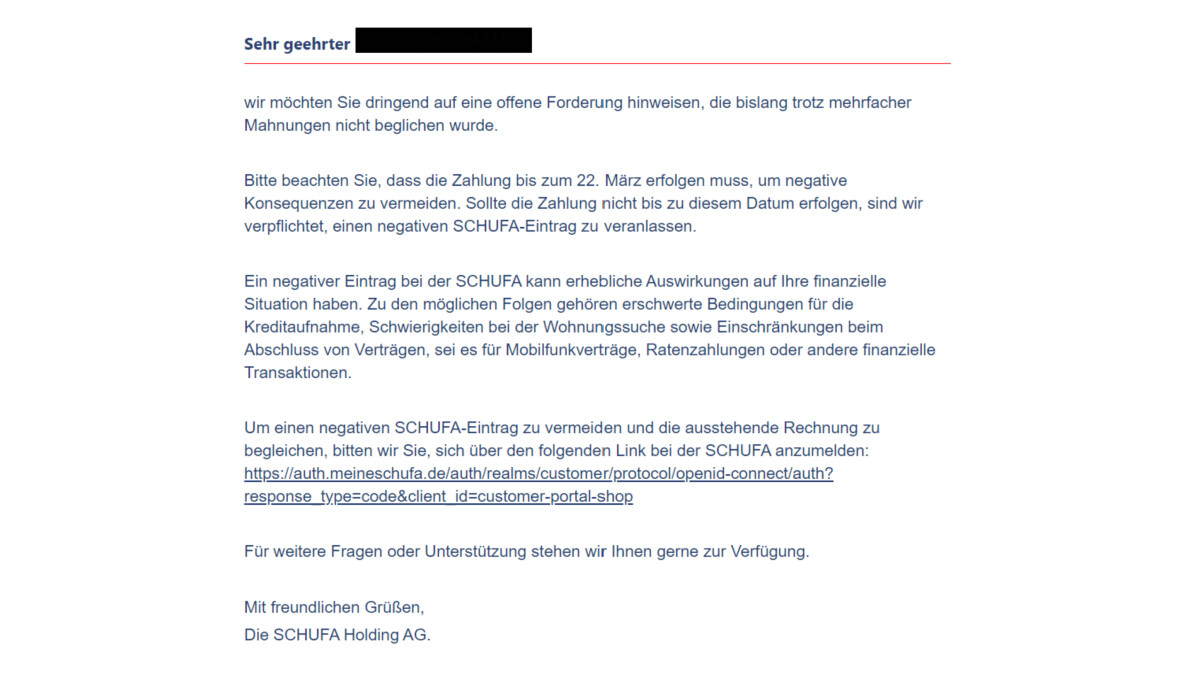If you have been contacted by SCHUFA with an urgent request, it could be a nasty phishing attempt. We’ll explain to you how you can recognize them.
Anyone who has recently received an email from SCHUFA should definitely check its authenticity. (Source: Rawpixel/depositphotos.com)
If you want to sign a new cell phone contract or rental agreement, SCHUFA will usually first ask for information about your creditworthiness. So it’s understandable that most of you don’t want to risk a negative entry under any circumstances and fear the consequences.
Fraudsters on the Internet are currently trying to get your money using phishing emails by triggering precisely these uncertainties. We will explain in more detail below how the criminals operate this scam and how you can expose them.
Phishing emails from “SCHUFA” are currently in circulation
The dubious emails in the name of SCHUFA are currently stoking the fears of those affected and are demanding payment from them by March 22, 2024. Apparently there is an outstanding debt that you should pay directly via the link provided in the message. Both the consumer advice center and Schufa itself have already reported on these cases and are warning those affected about the fraudsters.

Those affected by phishing emails are asked to provide their data in order to avoid a negative SCHUFA entry. (Source: consumer advice center)
In this nasty scam, the criminals put a lot of pressure on you and, as a result, give you a negative SCHUFA entry if you don’t follow up on the request. The alleged consequences would be “more difficult conditions for obtaining credit, difficulties in finding accommodation” and other problems with “financial transactions” of any kind.
But under no circumstances should you respond to this warning about the supposed “outstanding invoice” and you should also avoid clicking on the link in the email. By giving cybercriminals access to your personal information or even your bank account, you risk data theft or a money scam.
You can recognize fraudulent phishing emails using these tips
In such scams, those affected are often put under a lot of pressure to follow up on a specific issue, such as an allegedly outstanding invoice, as quickly as possible. Terms like “reminders” or the constant repetition of “negative” reinforce the feeling and are intended to ensure that your data is revealed quickly.
In such cases, it is best to contact SCHUFA first by another means, such as the official customer service telephone number 0611 – 92780, in order to receive reliable information. You can also report identity fraud to SCHUFA using the following questionnaire.
Since criminals on the Internet often rely on automatically generated messages and use translation programs for this, spelling errors and strange wording increasingly appear in phishing emails. You can often identify fraudsters’ fake emails using features like these and ignore them.
Real company logos can also appear in phishing emails, but these can easily be copied and pasted from official messages to deceive you. In contrast, the sender addresses of SCHUFA or other credit institutions usually differ from your official emails, which is why you should definitely pay attention to this.
What do criminals achieve with phishing attacks?
Phishing is used on the Internet to collect real user data. These can be used to make money when email addresses, names and other information are sold for advertising purposes or passed on in criminal forums. With the data obtained, cyber criminals can also target future phishing attacks more specifically, making their attacks more effective.
Have you received a suspicious email?
Forward it to [email protected]
or follow us on:
Phishing checklist
- ✔
Spelling mistake? - ✔
Sensitive data requested? - ✔
Official logos? - ✔
Unknown sender?
Attachments and links contained in malicious emails often introduce malware or viruses to your computer. In addition, you should not simply ignore suspicious emails. Forward it to the email address above and help us report future phishing attacks.
More fraud warnings on netzwelt – stay one step ahead of cybercriminals
If you want to stay informed about the latest fraud reports, subscribe to netzwelt on X, Facebook and Instagram. You can also find all articles on the topic on the next page.
- ” Tip: The best VPN providers for more security and data protection
- » Buy balcony power plant: Comparison of the best solar systems
Don’t miss anything with this NETWORK WORLDNewsletter
Every Friday: The most informative and entertaining summary from the world of technology!
